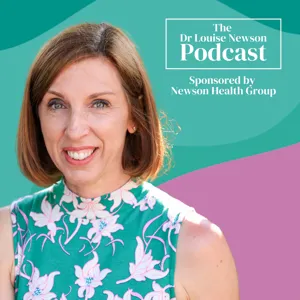Podcast Summary
Understanding men's health as a whole: GPs consider men's overall health, not just symptoms, and specialists should communicate effectively to ensure holistic care.
Men's health is more complex than just treating specific issues, such as the prostate or erectile dysfunction. Dr. Jeff Foster, a local GP and mental health specialist, explained that as a GP, he's trained to look at patients as a whole person, not just their individual symptoms. He noted that specialists tend to focus on their area of expertise but may overlook the bigger picture. Men often feel lost after seeing specialists and coming back to primary care without a clear understanding of their overall health. Dr. Foster shared his experience of training in various hospital specialties and feeling that specialists were unnecessarily bringing in other specialists for minor issues. He emphasized the importance of treating men as whole individuals and considering how different aspects of their health might be connected.
Addressing men's health holistically: A comprehensive approach is essential for effectively addressing men's health concerns, as symptoms can indicate underlying conditions and require a patient-centered, overall view for optimal health outcomes.
A holistic approach is crucial in addressing men's health issues. Men's health is not just about erection problems or hormone imbalances, but rather a complex interplay of various physical and mental health factors. Rushing to label each symptom and directing patients to specific specialists may overlook the underlying causes. Instead, healthcare professionals should consider the overall picture and address both the presenting symptoms and the underlying conditions to achieve optimal health outcomes. For instance, erectile dysfunction could be a sign of cardiovascular disease, and treating the root cause rather than just the symptom can prevent future complications. Additionally, easy access to certain medications like Viagra, while helpful for some, may overlook the importance of proper diagnosis and comprehensive care. Ultimately, a comprehensive, patient-centered approach is essential for effectively addressing men's health concerns.
Erectile problems as a gateway to heart health: Erectile dysfunction can indicate underlying heart health issues. Regular check-ups and open discussions about sexual health can help identify potential concerns early.
Erectile problems in men can be a sign of underlying heart health issues. Professor Mike Kirby, a British Sexual Medicine expert, referred to this connection as a "gateway to the heart." The small blood vessels in the penis can become damaged and narrowed, leading to erectile dysfunction. This condition may also affect larger blood vessels in the heart. Men with diabetes or other health conditions may not exhibit symptoms, making it crucial for proper assessment by healthcare professionals. Unfortunately, societal pressures and conflicting information make it challenging for men to seek medical advice, especially when it comes to sexual health. Women, too, often face a lack of discussion around sexual dysfunction, particularly during menopause. By openly discussing these issues and encouraging regular check-ups, we can help identify and address potential health concerns before they become more serious.
Encouraging Open Dialogue about Testosterone and Sexual Health: Doctors can create a non-judgmental atmosphere and ask direct questions to encourage men to discuss sensitive health issues related to testosterone and sexual health. Despite the importance of testosterone, there's a lack of licensed products for its treatment in the UK.
Doctors play a crucial role in creating a comfortable environment for men to discuss sensitive health issues, particularly those related to testosterone and sexual health. The awkwardness around these topics can lead to missed opportunities for early intervention and treatment. Doctors can encourage open dialogue by asking direct questions and creating a non-judgmental atmosphere. Testosterone is an essential hormone for men, responsible for sexual development, metabolic health, and mental clarity, among other benefits. Despite its importance, there is a lack of licensed products for testosterone treatment in men in the UK. Overall, fostering open communication between doctors and patients is key to addressing health concerns related to testosterone and beyond.
Approaches to diagnosing menopause and low testosterone differ: Women rely on symptoms for menopause diagnosis, while men can undergo a blood test for low testosterone. However, determining who needs testosterone replacement therapy requires a personalized approach considering symptoms and test results.
While both menopause in women and low testosterone in men involve hormonal changes, the approaches to diagnosis and treatment differ significantly. For women, diagnosing menopause and perimenopause relies on symptoms due to the lack of a definitive blood test. In contrast, men can undergo a blood test to diagnose low testosterone, but the variability and potential mimicking of other conditions make it more complex. The challenge lies in determining who needs testosterone replacement therapy, when, and why. While some argue for widespread screening, the lack of uniform symptom presentation and the potential risks associated with testosterone therapy complicate matters. Ultimately, a personalized approach that considers both symptoms and test results is crucial for accurate diagnosis and effective treatment.
Discussing the need for proper testosterone screening in men with diabetes and women's hormone replacement therapy benefits: 50% of diabetic men may have low testosterone, but only a few receive treatment. Hormone replacement therapy for women reduces heart attack risk, and testosterone therapy for men may have health benefits. Ignoring potential benefits could lead to increased health risks.
While there is a need for more screening for low testosterone levels in men with diabetes, it's crucial to avoid false positives and unnecessary treatments. Approximately 50% of diabetic men have low testosterone, but only a minimal number receive treatment. Hormone replacement therapy (HRT) for women has been shown to reduce heart attack risk, and the benefits of testosterone replacement therapy for men, including weight loss, improved insulin sensitivity, and bone density, may outweigh the costs. Ignoring the potential benefits of testosterone replacement therapy could lead to increased health risks, such as osteoporosis and hip fractures. The discussion also highlighted the importance of addressing the challenges in implementing HRT for women and testosterone replacement therapy for men, despite their proven health benefits.
A doctor's story of a patient's life-changing testosterone therapy: Older men with low testosterone levels can experience significant improvements in cognitive function, physical fitness, and overall well-being from testosterone therapy, despite challenges in obtaining it due to perceived risks.
Testosterone replacement therapy can significantly improve the quality of life for older men, particularly those with low testosterone levels. This was highlighted in a personal anecdote shared by a doctor about a patient in his 70s who experienced a remarkable turnaround in cognitive function, physical fitness, and overall well-being after receiving testosterone therapy. However, the patient faced challenges in obtaining this treatment due to concerns about potential risks, despite evidence suggesting that normalizing testosterone levels can reduce all-cause mortality. The reluctance to prescribe testosterone therapy, similar to HRT for women, is due to a lack of understanding and comfort with the topic. Yet, addressing this issue could lead to substantial health benefits for those in need.
Individualized Testosterone Treatment: What's Best for You?: Testosterone treatment should be tailored to individual needs and preferences, with informed discussions between men and healthcare professionals. Different methods of administration offer unique advantages and disadvantages. Unlicensed clinics and compounded hormones may pose risks, so prioritize safe and effective treatments.
When it comes to testosterone treatment for men, it's essential to consider individual needs and preferences, rather than relying on what one might read online. The most suitable treatment varies from person to person, and it's crucial to have an informed discussion with a healthcare professional. Testosterone treatment is not a one-size-fits-all solution, and not every man should or can undergo it. There are different methods of testosterone administration, including gels, creams, and injections, each with its advantages and disadvantages. While some may prefer gels for their convenience, others might prefer injections or creams based on their specific symptoms and lifestyle. It's also important to note that not all testosterone treatments are regulated or recommended by national and international bodies. Some unlicensed clinics and compounded hormones may pose risks and should be approached with caution. Ultimately, the goal of testosterone replacement therapy should be to improve overall health and well-being, not just to provide immediate symptom relief. It's vital to ensure that the treatment is safe, effective, and suitable for the individual, and that it has been extensively tested and proven to be beneficial for a large number of people. In summary, when considering testosterone treatment, it's essential to prioritize individualized care, avoid making hasty decisions based on online information, and seek the advice of a qualified healthcare professional.
Anabolic steroids can cause irreversible hormonal damage in young people: Using anabolic steroids can lead to testicular atrophy, infertility, and the need for long-term testosterone replacement therapy.
The use of testosterone analogues or anabolic steroids among young people, especially those in their late teens and early twenties, can have serious and irreversible consequences on their hormonal health and natural growth. These substances, which include testosterone precursors and growth hormones, are commonly used to enhance physical appearance and performance in gyms. However, they can lead to testicular atrophy, infertility, and the need for testosterone replacement therapy in the long term. It's important to note that the belief that anabolic steroids are only for short-term use and that the body will recover is a misconception. The high doses required to achieve rapid size gains can cause permanent damage to hormonal pathways. Education about the long-term risks is crucial, especially for parents and guardians of young people who may be using these substances without realizing the potential harm.
Checking for Low Testosterone Symptoms: Investigate low testosterone if experiencing fatigue, weight gain, decreased sex drive, forgetfulness, or noticeable changes. Consider the Adam score or Dr. Jeff Foster's resources for more information.
If you or your partner are experiencing symptoms of low testosterone, such as fatigue, weight gain, decreased sex drive, or forgetfulness, it may be worth investigating. These symptoms can often go unnoticed by the person experiencing them, but a partner or loved one may notice the changes. Dr. Jeff Foster recommends checking out his website, DrJeffFoster.co.uk or the new website h3health.co.uk, for more information. Another useful tip is to consider the Adam score or questionnaire, which can help assess the likelihood of having low testosterone. It's important to note that not all men experiencing these symptoms will have low testosterone, but it's worth considering as a possibility. Additionally, Dr. Foster emphasizes the importance of open communication and encouragement for men to prioritize their health and well-being. His upcoming book covers a range of men's health topics and is a valuable resource for those looking to learn more.
Assessing Symptoms of Testosterone Deficiency: If experiencing symptoms of low testosterone, take a questionnaire to assess symptoms, consult a doctor for proper diagnosis, and avoid self-ordering tests.
If you suspect you may have low testosterone, you can take a simple questionnaire to assess your symptoms. This testosterone deficiency questionnaire is easily accessible on various male health websites, including Stephanie's. However, it's crucial to consult a doctor for a proper diagnosis and blood test. Do not order a test on your own, as interpretation can be complex. If your test results come back as normal but you're still experiencing symptoms, consider consulting a male health specialist. They may be able to help ensure the test was administered correctly or that the reference range used aligns with current medical guidance. Overall, taking these steps can help ensure an accurate diagnosis and effective treatment if needed. For more information on menopause and perimenopause, visit menopausedoctor.co.uk or download the Balance app.





